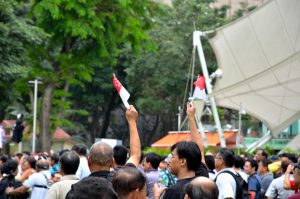‘Sites’ of resistance: alternative websites and state-society relations
September 28, 2020

The International Day for Universal Access to Information is held annually on 28 September to raise awareness of the right to seek and receive information, which is essential to freedom of expression and sustainable development. In ‘Sites’ of Resistance: Alternative Websites and State-Society Relations (British Journal of Sociology, 2002), Associate Professor Ho Kong Chong (NUS Department of Sociology), along with Professor Zaheer Baber (University of Toronto Department of Sociology) and Professor Habibul Khondker (Zayed University Department of Social Science), show how Singapore’s development as a knowledge-based economy through the use of information technology has contributed to greater freedom of expression by civil society in cyberspace, and how this conflicts with Singapore’s traditionally regulative role over information.
The authors argue that Singapore’s ability to achieve its goals of rapid industrialisation in its nascent years was facilitated by a curtailment of an active citizenry that could have contested and resisted specific state policies. However, the development of Singapore’s cyberspace today has opened up new spaces for social groups to influence policies on issues like gender and the environment. Examples include People Like Us, a gay equality advocacy group in Singapore, and the Nature Society of Singapore. Opposition political parties like the Workers’ Party also have greater room for rallying and alternative expression. Indeed, there are now many “virtual Speakers’ Corners”.
The Singaporean state has come to recognize the importance of negotiation following various pressures and demands from the new social groups, and has limited censorship and regulation over the internet presence of alternative voices. Indeed, the authors argue that the state’s desire for greater creativity and independent critical thinking among its citizenry – in order to achieve new economic goals – has made for an uneasy relaxation of the state’s regulatory role over information.
Nevertheless, the authors also note an interesting twist whereby non-state actors, in support of the government’s defence of traditional and conservative values, have also used the internet to advocate their positions. For example, a site called Singapore Virgins calls for teenagers to uphold traditional sexual values and abstain from pre-marital sex. Therefore, mainstream voices, in line with the government’s stances, are also gaining greater room for expression alongside alternative voices.
Read the article here.
